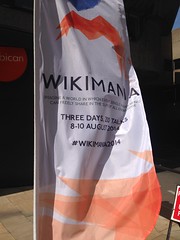By Andreas Kolbe
With contributions from Jake S, Nathalie Collida and Triptych

.
The Wikimedia movement’s 10th Wikimania conference at the London Barbican (6–10 August 2014) concluded on Sunday. Two years ago, when discussing the London bid for the event, Jimmy Wales had confidently stated,
I spend a lot of time in London, and believe I can help significantly with ensuring a well-funded conference at a great venue, with VIP speakers (academics, politicians, media, entertainment). I have extensive and good relationships with the UK press and believe I can help land great press coverage for the conference. I’m a big fan of this bid.–Jimbo Wales (talk) 16:36, 27 July 2012 (UTC)
Unfortunately for Jimbo, those extensive and good relationships weren’t quite enough to overcome the healthy skepticism of the UK press towards his almost blatant contempt for the EU’s recent “Right to be Forgotten” ruling. This culminated in a frankly embarrassing Newsnight interview with James O’Brien, in which Wales insisted, apparently without irony, that requests for Google to remove links – not actual web pages, not actual source material, just links – to pages covered by the ruling (which includes libellous attack pages, revenge porn, and old police blotters) should, at minimum, be adjudicated by a court of law. In other words, European taxpayers should pay, without limitation, for their already-overburdened court systems to deal with every single revenge-porn complaint Google receives under the ruling, at a time when the economies of half the EU’s member-states are already close to the brink, and with energy prices set to rise precipitously during the coming winter.
And as if that wasn’t enough, the Wikimedia Foundation actually upped the ante by publishing a list of take-down notices received from Google, thus eliminating any chance victims
…continue reading Wikimania 2014
